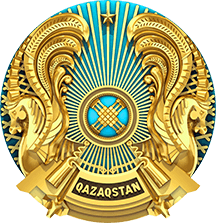Press Release №4. The base rate remains unchanged at 9.00%
The Monetary Policy Committee of the National Bank of Kazakhstan has made a decision to keep the base rate unchanged at 9.00% per annum with the interest rate corridor of +/- 1.0 percentage points. Consequently, the rate for the liquidity provision standing facilities is to be set on 10.00% and for the liquidity withdrawal standing facilities at 8.00%.
The decision was made on the basis of the prevailing pro-inflationary pressure in the economy associated with persisting imbalances in food markets, high uncertainty in the external sector, as well as the presence of accelerating inflation risks. The population's inflationary expectations are weakly anchored and remain at an elevated level. At the same time, it is expected that the disinflationary effect of consumer demand will gradually decrease, which will be due to the restoration of economic activity in the conditions of improving the epidemiological situation.
The inflationary background in February 2021 remained unchanged, forming in accordance with the forecasts of the National Bank. The annual inflation rate amounted to 7.4% (7.4% in January 2021). The main contribution to inflation continues to be made by the acceleration of the food component, which grew by 11.6% (11.4%). The growth of the non-food component and paid services amounted to 5.2% (5.3%) and 3.9% (4.1%), respectively.
In the structure of food inflation, an increase in the prıce of certain types of goods (oils and fats, eggs, sugar) is observed due to the limited supply, rising the prices on the world commodity markets and the prices of domestic producers. At the same time, the slowdown in the growth of prices for meat and meat products, bakery products and cereals, which was observed in the previous months, stopped in February. Restraining effects on inflation are being made by moderate growth rates of non-food products prices in light of suppressed consumer demand and trends in consumer preferences towards cheaper products. In the structure of paid services, a decrease in tariffs for certain types of housing and public regulated utility services is observed. The rise in prices for personal and leisure services continued.
Seasonally-adjusted core inflation accelerated in February 2021 and amounted to 8.3% annually. For the first time since May 2020, core inflation estimates significantly exceeded overall inflation, which indicates the remained risks of accelerating inflation as a result of rising food prices and a faster recovery in consumer demand.
Inflationary expectations of the population in February 2021 remained unchanged, while staying unstable and sensitive to the imbalances in certain food markets. The quantitative estimate of inflation for the year ahead was 6.7%. A high level of uncertainty remains among the respondents - more than a third of the respondents (34%) found it difficult to assess their expectations.
In January 2021, business activity in a number of key sectors of the economy contracted, reflecting a deeper than expected decline in GDP (-4.5%). A significant decline was observed in the oil production sector, as well as in the transport and trade sectors. According to the leading indicator - the business activity index, in February 2021 there was a recovery to 49.0 points (in January - 48.4). According to the survey, enterprises in the real sector note an improvement in the business environment, for the first time since January 2020 the balance of answers on assessing current conditions turned out to be positive, amounting to 0.4. Enterprises believe that infrastructure, access to finance and credit, and business protection in general have improved. At the same time, the demand for products/services and the tax burden remain factors that have a negative impact on the business environment.
The outlook for the global economy, including the economies of trading partner countries, has improved. The IMF predicts that global growth will accelerate to 5.5% in 2021, driven by the expected package implementation of incentive measures in large developed countries and a larger vaccination against COVID-19. The recovery dynamics in the Kazakhstan’s trading partner countries’ economies will continue. At the same time, the recovery of the Chinese economy will occur at a faster pace as result of increased investment activity and consumption, as well as growth in exports. In the EU countries, economic recovery will be constrained by the persistence of restrictive measures in the fight against the coronavirus pandemic. In Russia, the OPEC+ agreement and weak domestic demand will constrain higher recovery growth.
Forecasts for the future dynamics of oil prices have been revised upward due to the recovery in the global economy and expectations for an increase in demand, including for commodities. Despite the decision taken by OPEC+ to maintain the level of oil production, the prospects for the development of the world oil market are still associated with high uncertainty linked to the further dynamics of the pandemic, the effectiveness of vaccinations and further actions of OPEC+ participants. Under these conditions, as a prerequisite for the forecast round "February-March 2021", oil production in 2021 remained at the level of 86 million tons, the price of Brent oil under the baseline scenario was increased from $45 per barrel to $50 per barrel until the end of 2021 and for 2022.
The National Bank adjusted its expectations for economic growth rates downward in the current year, taking into account the current dynamics and the deteriorating situation in certain sectors of the economy at the beginning of this year. In 2021, under the baseline scenario, economic growth will be 3.4%-3.7% (y/y) with an acceleration to 3.7-4.0% in 2022. The main contribution to economic growth will be made by the recovery of domestic demand on account of rising incomes of the population, continued implementation of government anti-crisis programs and improved investor sentiment. From the second half of 2021, a recovery in real exports is expected in conditions of an improving situation in the global economy and in Kazakhstan's trading partners. At the same time, the expected recovery in imports as a result of expanding domestic demand will limit the contribution of net exports to GDP growth.
Annual inflation will slow down to the level of the upper limit of the target band of 4-6% in 2021 in accordance with the National Bank's estimates under the baseline scenario. This will be facilitated by the stabilization of the situation in individual food markets and the exit from the calculation of high values of growth in prices for food products. As the domestic epidemiological situation improves and economic activity recovers, consumer demand is expected to expand, which will gradually reduce the disinflationary pressure on the prices of non-food products and paid services. In the short term, pro-inflationary pressure from the external sector is expected to prevail due to the accelerating inflation in Russia (up to 5.7% in February of this year) and continuing growth in world food prices for nine months in a row, which led to multi-year highs of the FAO food price index. In the medium term, the inflationary background will remain moderate. This is evidenced by estimates on the formation of inflation indicators in trading partner countries near the target, as well as expectations for the normalization of the situation in the world food markets.
In general, the risks of accelerating inflation under the influence of internal and external factors continue to remain at a high level. Domestic risks are associated with the persistence of imbalances in certain food markets and a faster than expected recovery in domestic demand. The main factor of external risks remains the deteriorating situation of the coronavirus pandemic in the world caused by the emergence of new strains and the risks of ineffective vaccination. Such scenario could become an obstacle to the recovery of the world economy, cause a drop in oil prices and a disruption in the supply of goods and services. A high risk of an increase in the external inflationary background still present in view of a more prolonged rise in world food prices. In addition, the geopolitical risks persist, which are associated with the strengthening of sanctions rhetoric against trading partner countries, a potential increase in volatility in the global financial markets and a sharp decline in energy prices due to an increase in supply by OPEC+ countries and outside OPEC.
External monetary conditions in developed countries will continue to remain stimulating in the medium term. The US Federal Reserve and the ECB continue to reiterate their commitment to stimulating monetary policy. At the same time, in developing countries, including the main trading partners of Kazakhstan, as inflationary processes accelerate, a transition to a cycle of rate increases is possible.
According to our estimates, under the baseline scenario monetary conditions in the medium term will gradually return to neutral levels. The current balance of inflationary risks neutralized additional space for easing of monetary conditions. At the same time, in case of a significant deterioration in the prospects for inflation to further reduce to the target level, the National Bank, having all needed tools, will take the necessary proactive decisions.
The next planned decision of the National Bank of the Republic of Kazakhstan about the base rate will be announced on April 26, 2021 at 15:00 Nur-Sultan time.
More detailed information for mass media is available upon request:
+7 (7172) 775 205
e-mail: press@nationalbank.kz
www.nationalbank.kz




